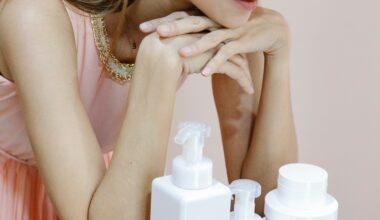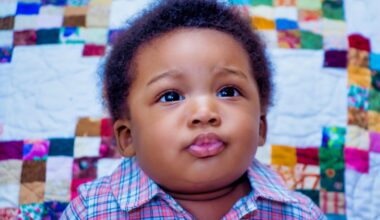
Styling your natural hair is fun if you don’t always have to worry about losing a huge chunk of your hair in the process. Sometimes our hair can start to break or fall out, which can be extremely frustrating. In this article, we’ll explore the meaning of hair breakage and hair loss in women, as well as some potential causes and treatments.
Breakage occurs when the hair shaft becomes weak and starts to snap. This can happen for a variety of reasons, including over-styling, extreme heat, or your hair not getting enough nutrients. When the hair breaks, the ends become frayed and split. Breakage can also occur if the hair is chemically treated, such as with bleach or dye.
Hair loss on the other hand is when the hair falls out in patches or clumps from the root. Hair loss can be caused by several factors, including genetics, stress, illness, medications, and hormones.
Hair breakage is a common problem among black women with natural hair. The main reason for this is that Afro-textured hair is drier and more brittle than other types of hair. Our hair shafts are narrower and have a looser curl pattern. As a result, they are more likely to break when they are subjected to stress. Our hair is also more prone to tangles and knots.
Causes
Hair breakage or hair loss can be caused by a number of factors, including:
-
Overly tight hairstyles
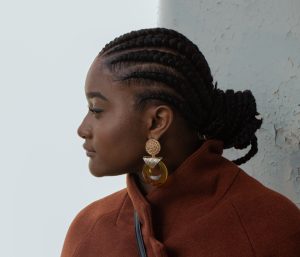
If you love wearing cornrows, braids, or ponytails, that’s great! But it’s important to make sure that these styles aren’t too tight. If they’re too tight they’ll pull your hair follicles and put a strain on your roots causing your hair to break.
To avoid this, make sure your cornrows, braids, and ponytails aren’t pulled too tight. You should also give your hair a break from these styles by switching to a more gentle styling routine every few weeks to give your follicles a chance to recover.
-
Insufficient Moisture or Nutrition
Another common cause of hair breakage is lack of moisture. Afro-textured hair is notoriously dry, so it’s important to keep it hydrated with regular deep conditioning treatments. When hair is lacking moisture, it becomes dry and brittle. This increases the likelihood of breakage, as dry and brittle hair is more prone to snapping or breaking. In addition, insufficient hydration can lead to scalp problems such as dandruff, which can also contribute to hair loss.
To prevent these issues, it is important to keep hair properly hydrated by using a moisturizing shampoo and conditioner, and regularly deep conditioning.
In addition, drink plenty of water every day to keep your entire body (including your hair) properly hydrated.
-
Harsh weather Conditions

When cold weather conditions like winter and harmattan strike, it’s not only your skin that suffers, your hair does too. Doubling up on your haircare routine is very important because the cold air sucks up all the moisture in the environment. The chilly/dry air and dust can cause your strands to thin out and start breaking off. You can protect your hair from these weather conditions by;
- Regularly deep conditioning your hair to keep it hydrated and healthy,
- Using a humidifier to keep the air around you moist will help prevent your hair from drying out and breaking,
- Wearing a hat or scarf outdoors to protect your hair from the dry dusty air,
- Wearing a silk or satin bonnet to bed. This will help lock in moisture and prevent your hair from friction and getting matted while you sleep.
By following these tips, you can help to protect your hair from the cold frosty weather. Keep your hair healthy and happy all season long!
-
Stress
It’s no secret that stress can wreak havoc on our bodies. We may get headaches, our stomachs may get upset, and we may even break out in a cold sweat. But did you know that stress can also cause your full kinky hair to break or fall out?
When we’re stressed, our bodies go into “fight or flight” mode. This is when the body releases hormones like cortisol. Cortisol can cause the follicles in our scalp to become smaller and weaker, which leads to thinner, weaker hair. In some cases, it can even cause the follicles to stop producing hair altogether.
The increased levels of stress that often accompany pregnancy can also lead to hair loss or breakage. When we’re stressed, our hair follicles go into a resting phase. This means that the hair stops growing and the shafts become weaker making them prone to breakage. Hair loss due to stress is usually temporary and the hair will eventually grow back. However, if the stress is chronic or severe, it could lead to permanent hair loss. Hair breakage is another common symptom of stress.
If you’re experiencing hair loss or hair breakage due to stress, there are a few things you can do to help mitigate the problem. First, try to reduce the amount of stress you go through. If that’s not possible, consider taking supplements like biotin or omega-3 fatty acids, which can boost healthy hair growth. You can also use gentle shampoos and conditioners that won’t strip your hair of its natural oils. Finally, make sure to get enough sleep and exercise, as this can help reduce stress levels.
-
Improper Care
The most common cause of hair breakage or hair loss in women with natural hair is improper care. This can include using the wrong products, not deep conditioning regularly, or using heat styling tools like straighteners, curling irons, etc.
Using harsh chemicals like relaxers or texturizers on your natural hair, can damage your hair shaft and make it more susceptible to breaking. If you want to use these products, make sure you follow the instructions carefully and don’t leave them on your hair for longer than recommended. You should also deep condition your hair regularly to help it lock in moisture that may have been stripped off by these chemicals and heat straighteners.
-
Hormonal Imbalance or Changes (e.g. during pregnancy, menopause)
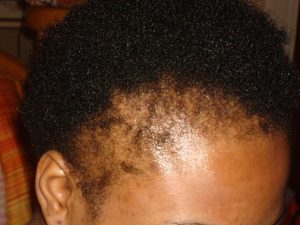
When our hormones fluctuate, it disrupts the normal growth cycle of our hair. Hormonal imbalances can cause our hair to become dry and brittle, and can even lead to hair loss. There are a few different ways that hormonal changes can impact our hair.
First, an increase in androgens can cause our hair follicles to shrink. This makes our hair shafts thinner and more likely to break. Androgens can also cause our scalp to produce more oil, which can clog the pores and lead to scalp conditions like dandruff.
Another way that hormonal changes can impact our hair is by altering the levels of estrogen in our bodies. Estrogen is a hormone that helps to keep our hair healthy and lustrous. When our estrogen levels drop (as they do during menopause, or after pregnancy), our hair can become dry, brittle, and more likely to fall out.
Finally, thyroid problems can also cause hair loss or breakage. The thyroid is a gland that regulates many of the body’s functions, including metabolism. When the thyroid isn’t functioning properly, it can throw off the whole endocrine system, which can lead to hair loss.
If you’re experiencing hair loss or breakage and you think it might be due to hormonal changes, we recommend seeing a dermatologist. They can perform some tests to determine if your hormones are indeed the cause of your hair problems. And if they are, they can help you find a way to balance your hormones and get your hair back to normal.
-
Medical Conditions (e.g. alopecia, Trichotillomania)
Your natural hair breaking or falling out can be a symptom of underlying medical conditions like:
- Alopecia areata also known as baldness is an autoimmune disease that causes patchy hair loss on the scalp or beard.
- Trichotillomania also known as hair-pulling disorder is a condition where people have the irresistible urge to pull out their hair, leading to hair loss.
- Telogen effluvium is a scalp disorder where the hair follicles go into a resting phase and then shed, leading to hair thinning.
Conclusion
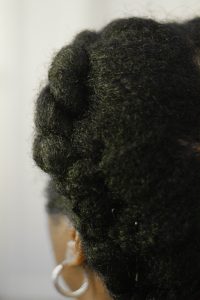
Finally, your natural hair breaking can be a result of malnourishment caused by an unhealthy diet. An unhealthy diet that does not provide essential vitamins, minerals, and other necessary components for the growth and health of hair can lead to brittle strands that break off easily or fall out completely. If you’re concerned about hair breakage or loss, we recommend seeing a doctor so they can rule out any underlying health problems

